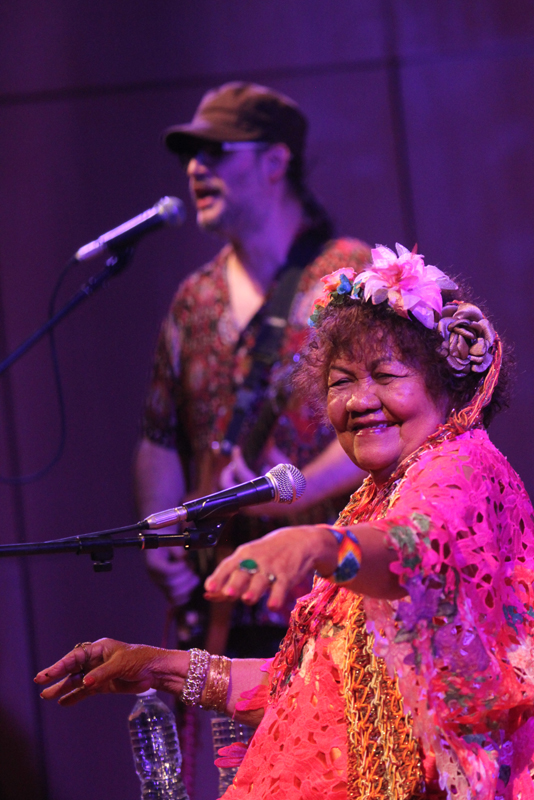Blog October 3, 2016
Dona Onete: A Queen of the Brazilian Amazon Rocks New York
Seventy-four year old Brazilian diva Dona Onete made her U.S. debut on Sept. 27 at Elebash Recital Hall in New York, and it was a revelation. Onete (pronounced oh-NEH-chee) comes from Amazonia in northern Brazil. She spent her life researching and teaching the history of this complex, little-understood region, including its musical folklore. Delving into local dance styles—carimbó, siriá and banquê—she began composing songs, gradually developing her own style, which she called carimbó chamegado. Over the years, she composed over 300 songs, yet Onete performed essentially for pleasure, mostly in small local venues. She concentrated instead on her career as a professor of history and Amazonian studies in a Brazilian town few beyond this region have even heard of, Igaparé Miri.
[caption id="attachment_31788" align="aligncenter" width="401"] Photo by Sebastian Bouknight[/caption]
[caption id="attachment_31787" align="aligncenter" width="401"]
Photo by Sebastian Bouknight[/caption]
[caption id="attachment_31787" align="aligncenter" width="401"] Photo by Sebastian Bouknight[/caption]
Onete retired to Predreira in Belém and, as the story goes, a local band heard her sing and invited her to join them. The result was the septuagenarian’s debut album Fetiço Cabloco (2014). I must say, the moment this title reached our ears at Afropop, we were hooked—without even knowing Onete’s surprising back story. Producer Marlon Bishop featured it on our 2014 program The Mighty Amazon. What was so striking was the forceful authority of Onete’s voice, perfectly tuned despite its ragged edges, its power undiminished despite the long life experience it so clearly expressed. And as the full house at Elebash attested, we were not alone. Among those packing the hall were many Brazilians, as well as champions of Brazilian music Caetano Veloso, Arto Lindsay and David Byrne.
[caption id="attachment_31789" align="aligncenter" width="401"]
Photo by Sebastian Bouknight[/caption]
Onete retired to Predreira in Belém and, as the story goes, a local band heard her sing and invited her to join them. The result was the septuagenarian’s debut album Fetiço Cabloco (2014). I must say, the moment this title reached our ears at Afropop, we were hooked—without even knowing Onete’s surprising back story. Producer Marlon Bishop featured it on our 2014 program The Mighty Amazon. What was so striking was the forceful authority of Onete’s voice, perfectly tuned despite its ragged edges, its power undiminished despite the long life experience it so clearly expressed. And as the full house at Elebash attested, we were not alone. Among those packing the hall were many Brazilians, as well as champions of Brazilian music Caetano Veloso, Arto Lindsay and David Byrne.
[caption id="attachment_31789" align="aligncenter" width="401"]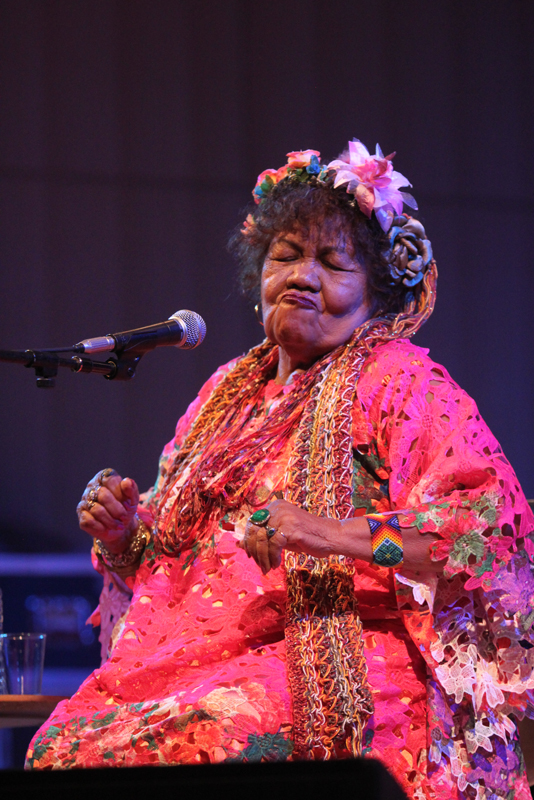 Photo by Sebastian Bouknight[/caption]
Onete’s carimbó chamegado is considered slower and more sensual than traditional carimbó. Sensual, absolutely, but there was not a song in Onete’s 80-minute set that I would describe as slow. The rhythms ranged from carnival romps to rollicking grooves falling somewhere between ska and speed-polka. The particular blend of African, indigenous and European elements involved would require some study to parse, but the sound was instantly contagious. Folks were soon dancing in the aisles at Elebash, and they never stopped. No wonder, as Marlon noted in his program, carimbó is considered an essential source for the 1990s' lambada dance craze.
[caption id="attachment_31785" align="aligncenter" width="600"]
Photo by Sebastian Bouknight[/caption]
Onete’s carimbó chamegado is considered slower and more sensual than traditional carimbó. Sensual, absolutely, but there was not a song in Onete’s 80-minute set that I would describe as slow. The rhythms ranged from carnival romps to rollicking grooves falling somewhere between ska and speed-polka. The particular blend of African, indigenous and European elements involved would require some study to parse, but the sound was instantly contagious. Folks were soon dancing in the aisles at Elebash, and they never stopped. No wonder, as Marlon noted in his program, carimbó is considered an essential source for the 1990s' lambada dance craze.
[caption id="attachment_31785" align="aligncenter" width="600"]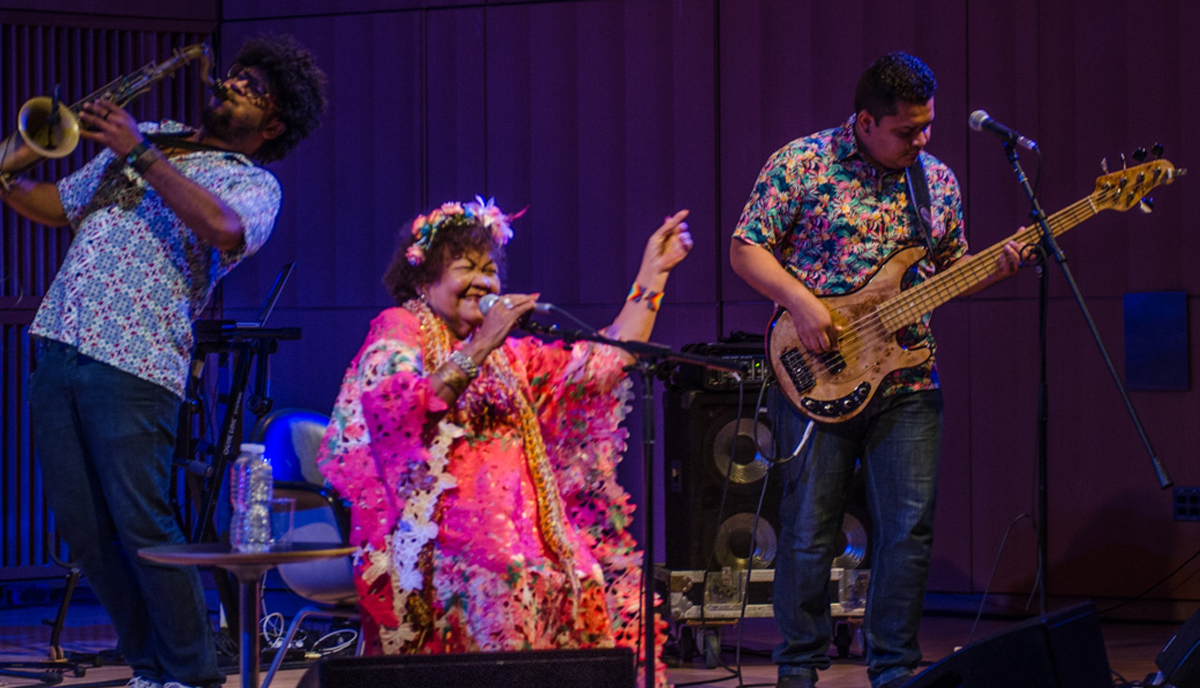 Photo by Banning Eyre[/caption]
[caption id="attachment_31784" align="aligncenter" width="600"]
Photo by Banning Eyre[/caption]
[caption id="attachment_31784" align="aligncenter" width="600"]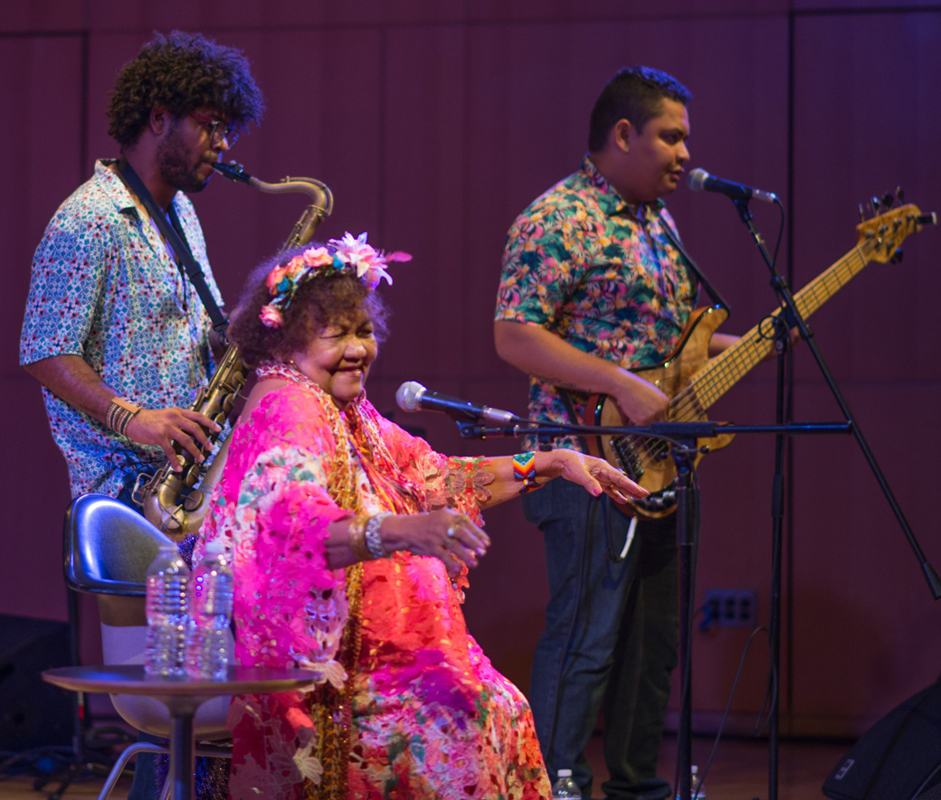 Photo by Banning Eyre[/caption]
For all the energy and spirit she projected, Onete sat in a chair to sing. No matter: she sounded every bit as good as on that fine debut recording, maybe better. Song after song she crooned and belted, feeding off the audience’s mounting enthusiasm. Expressions of delight animated the contours of her round, expressive face. Onete’s five-piece combo had the polish of a seasoned bar band. Guitarist and musical director Pio Lobato thrashed out exuberant rhythms and took short rocking solos. There was a drummer and a percussionist, keeping the rhythmic textures consistently rich. The band’s showiest member was sax and keyboard man Daniel Serrão, who seemed possessed by the music, parading the stage with his honking tenor sax throughout.
The set easily earned a sustained standing ovation. Who knows whether Onete will be up to more extensive touring? But we have to hope so. She’s a marvel. Kudos to the presenters at Live@365 for a truly memorable night of music.
[caption id="attachment_31786" align="aligncenter" width="401"]
Photo by Banning Eyre[/caption]
For all the energy and spirit she projected, Onete sat in a chair to sing. No matter: she sounded every bit as good as on that fine debut recording, maybe better. Song after song she crooned and belted, feeding off the audience’s mounting enthusiasm. Expressions of delight animated the contours of her round, expressive face. Onete’s five-piece combo had the polish of a seasoned bar band. Guitarist and musical director Pio Lobato thrashed out exuberant rhythms and took short rocking solos. There was a drummer and a percussionist, keeping the rhythmic textures consistently rich. The band’s showiest member was sax and keyboard man Daniel Serrão, who seemed possessed by the music, parading the stage with his honking tenor sax throughout.
The set easily earned a sustained standing ovation. Who knows whether Onete will be up to more extensive touring? But we have to hope so. She’s a marvel. Kudos to the presenters at Live@365 for a truly memorable night of music.
[caption id="attachment_31786" align="aligncenter" width="401"]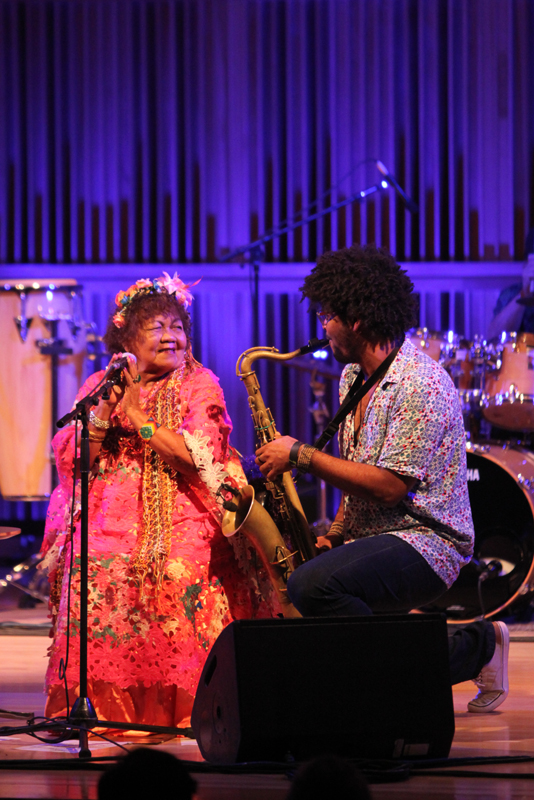 Photo by Sebastian Bouknight[/caption]
Photo by Sebastian Bouknight[/caption]
 Photo by Sebastian Bouknight[/caption]
[caption id="attachment_31787" align="aligncenter" width="401"]
Photo by Sebastian Bouknight[/caption]
[caption id="attachment_31787" align="aligncenter" width="401"] Photo by Sebastian Bouknight[/caption]
Onete retired to Predreira in Belém and, as the story goes, a local band heard her sing and invited her to join them. The result was the septuagenarian’s debut album Fetiço Cabloco (2014). I must say, the moment this title reached our ears at Afropop, we were hooked—without even knowing Onete’s surprising back story. Producer Marlon Bishop featured it on our 2014 program The Mighty Amazon. What was so striking was the forceful authority of Onete’s voice, perfectly tuned despite its ragged edges, its power undiminished despite the long life experience it so clearly expressed. And as the full house at Elebash attested, we were not alone. Among those packing the hall were many Brazilians, as well as champions of Brazilian music Caetano Veloso, Arto Lindsay and David Byrne.
[caption id="attachment_31789" align="aligncenter" width="401"]
Photo by Sebastian Bouknight[/caption]
Onete retired to Predreira in Belém and, as the story goes, a local band heard her sing and invited her to join them. The result was the septuagenarian’s debut album Fetiço Cabloco (2014). I must say, the moment this title reached our ears at Afropop, we were hooked—without even knowing Onete’s surprising back story. Producer Marlon Bishop featured it on our 2014 program The Mighty Amazon. What was so striking was the forceful authority of Onete’s voice, perfectly tuned despite its ragged edges, its power undiminished despite the long life experience it so clearly expressed. And as the full house at Elebash attested, we were not alone. Among those packing the hall were many Brazilians, as well as champions of Brazilian music Caetano Veloso, Arto Lindsay and David Byrne.
[caption id="attachment_31789" align="aligncenter" width="401"] Photo by Sebastian Bouknight[/caption]
Onete’s carimbó chamegado is considered slower and more sensual than traditional carimbó. Sensual, absolutely, but there was not a song in Onete’s 80-minute set that I would describe as slow. The rhythms ranged from carnival romps to rollicking grooves falling somewhere between ska and speed-polka. The particular blend of African, indigenous and European elements involved would require some study to parse, but the sound was instantly contagious. Folks were soon dancing in the aisles at Elebash, and they never stopped. No wonder, as Marlon noted in his program, carimbó is considered an essential source for the 1990s' lambada dance craze.
[caption id="attachment_31785" align="aligncenter" width="600"]
Photo by Sebastian Bouknight[/caption]
Onete’s carimbó chamegado is considered slower and more sensual than traditional carimbó. Sensual, absolutely, but there was not a song in Onete’s 80-minute set that I would describe as slow. The rhythms ranged from carnival romps to rollicking grooves falling somewhere between ska and speed-polka. The particular blend of African, indigenous and European elements involved would require some study to parse, but the sound was instantly contagious. Folks were soon dancing in the aisles at Elebash, and they never stopped. No wonder, as Marlon noted in his program, carimbó is considered an essential source for the 1990s' lambada dance craze.
[caption id="attachment_31785" align="aligncenter" width="600"] Photo by Banning Eyre[/caption]
[caption id="attachment_31784" align="aligncenter" width="600"]
Photo by Banning Eyre[/caption]
[caption id="attachment_31784" align="aligncenter" width="600"] Photo by Banning Eyre[/caption]
For all the energy and spirit she projected, Onete sat in a chair to sing. No matter: she sounded every bit as good as on that fine debut recording, maybe better. Song after song she crooned and belted, feeding off the audience’s mounting enthusiasm. Expressions of delight animated the contours of her round, expressive face. Onete’s five-piece combo had the polish of a seasoned bar band. Guitarist and musical director Pio Lobato thrashed out exuberant rhythms and took short rocking solos. There was a drummer and a percussionist, keeping the rhythmic textures consistently rich. The band’s showiest member was sax and keyboard man Daniel Serrão, who seemed possessed by the music, parading the stage with his honking tenor sax throughout.
The set easily earned a sustained standing ovation. Who knows whether Onete will be up to more extensive touring? But we have to hope so. She’s a marvel. Kudos to the presenters at Live@365 for a truly memorable night of music.
[caption id="attachment_31786" align="aligncenter" width="401"]
Photo by Banning Eyre[/caption]
For all the energy and spirit she projected, Onete sat in a chair to sing. No matter: she sounded every bit as good as on that fine debut recording, maybe better. Song after song she crooned and belted, feeding off the audience’s mounting enthusiasm. Expressions of delight animated the contours of her round, expressive face. Onete’s five-piece combo had the polish of a seasoned bar band. Guitarist and musical director Pio Lobato thrashed out exuberant rhythms and took short rocking solos. There was a drummer and a percussionist, keeping the rhythmic textures consistently rich. The band’s showiest member was sax and keyboard man Daniel Serrão, who seemed possessed by the music, parading the stage with his honking tenor sax throughout.
The set easily earned a sustained standing ovation. Who knows whether Onete will be up to more extensive touring? But we have to hope so. She’s a marvel. Kudos to the presenters at Live@365 for a truly memorable night of music.
[caption id="attachment_31786" align="aligncenter" width="401"] Photo by Sebastian Bouknight[/caption]
Photo by Sebastian Bouknight[/caption]







